Rail passengers protest fares hike at 100 stations
Demonstrations held across England and Scotland after cost of travel increases by 2.3%
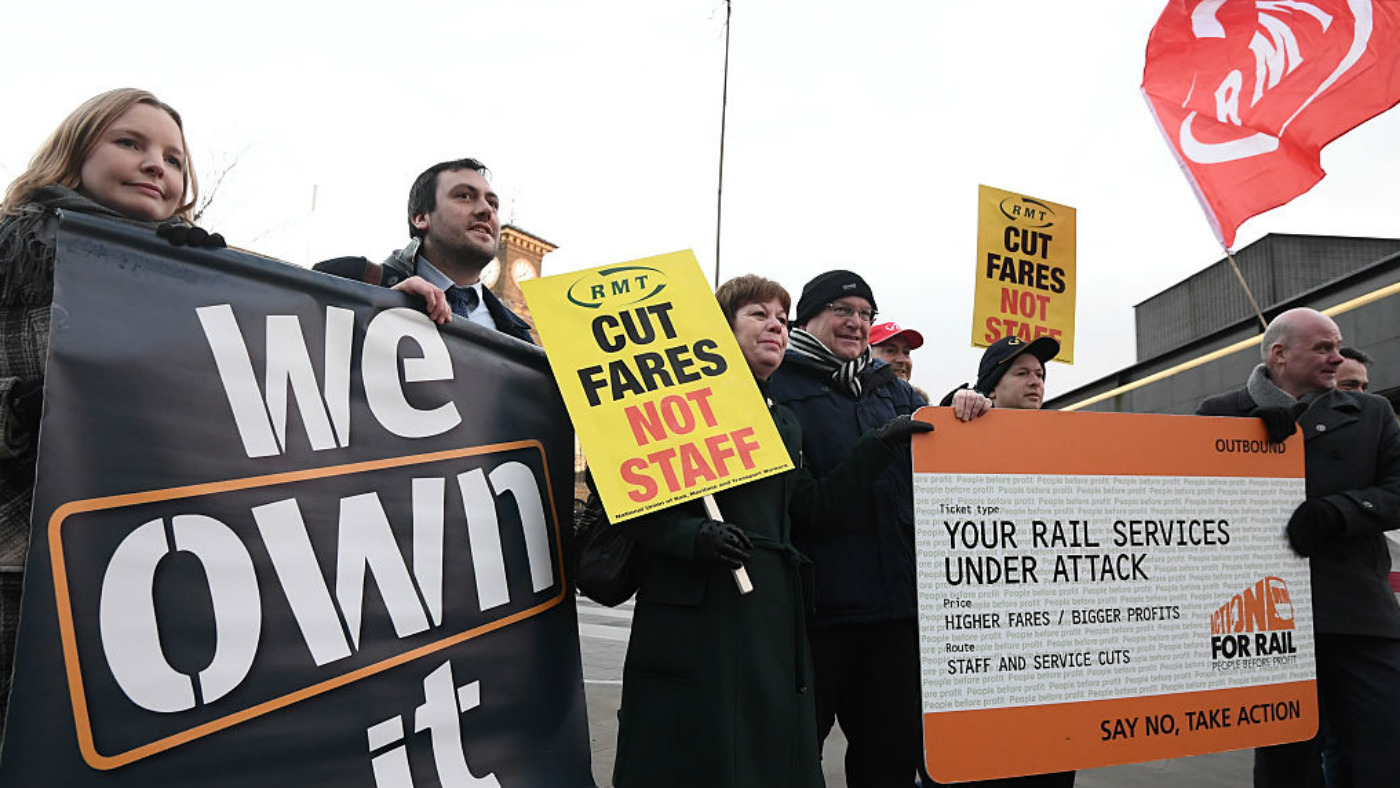
A free daily email with the biggest news stories of the day – and the best features from TheWeek.com
You are now subscribed
Your newsletter sign-up was successful
Rail passengers are protesting fare increases in England today and will take to the streets in Scotland tomorrow.
Demonstrations are taking place outside 100 stations across the two countries, organised by a coalition of passengers' groups.
Who is protesting?
The Week
Escape your echo chamber. Get the facts behind the news, plus analysis from multiple perspectives.

Sign up for The Week's Free Newsletters
From our morning news briefing to a weekly Good News Newsletter, get the best of The Week delivered directly to your inbox.
From our morning news briefing to a weekly Good News Newsletter, get the best of The Week delivered directly to your inbox.
Three groups are behind the action: We Own It; Action for Rail, and Bring Back British Rail. They say they want an end to a "rail rip-off" in which "train companies are milking the system and the government is letting them get away with it".
Who are these groups?
We Own It, which campaigns to prevent the privatisation of public services including the NHS, is partly funded by the progressive charity Network For Social Change. Action for Rail is funded by trade unions including the RMT, Aslef and Unite, while Bring Back British Rail, founded in 2009 by the artist Ellie Harrison, is a pressure group run by volunteers.
Where are the demonstrations?
A free daily email with the biggest news stories of the day – and the best features from TheWeek.com
Today's protests are being held outside stations across England, with the focus on King's Cross in London. Passengers are being asked to demonstrate in Scotland tomorrow, with Glasgow Central station at the forefront.
Any famous faces attending?
Labour leader Jeremy Corbyn will attend the King's Cross protest, says The Guardian.
How much have fares risen?
Some fares, including season tickets, are regulated by the government and have their price pinned to inflation. Others are not. The average increase of ticket prices across both categories is 2.3 per cent – and that's too much, say the groups.
What is the complaint?
Lianna Etkind, of the Campaign for Better Transport, told the BBC: "Today's fare rises are another kick in the teeth for long-suffering rail passengers. Many experienced a less frequent and more overcrowded service last year and now they are required to pay more for the same this year."
Bruce Williamson, of the independent campaign group Railfuture, said: "With the chaos on Southern, lacklustre performance in Scotland and stalled electrification on the Great Western main line, passengers are going to wonder what they are getting for their increased ticket price."
How much have fares risen since privatisation?
According to the BBC, even allowing for inflation, fares are up 25 per cent on the mid-1990s. Some tickets cost 40 per cent more than they did just ten years ago. Passengers are now expected to pay 70 per cent of the cost of the true cost of their journeys, as opposed to the 50 per cent after British Rail was privatised.
Is that good news for anybody except the train companies?
Yes, the taxpayer now meets less of the cost of rail journeys and while that is bad news for rail passengers, who pay more, those who do not travel by train are now footing less of the bill. Of course, if higher fares lead to an increase in road travel, that will affect drivers adversely through congestion and increased road repairs.
What does it mean for the workforce?
According to a poll conducted by Sainsbury's Bank, the increase in rail fares has led 200,000 people to give up working completely, The Times reports. Around 600,000 have changed jobs in the past three years because of increased fares and 77,000 are said to be considering quitting in the next two years.
How do prices compare to the rest of Europe?Not well, says Action for Rail, which has calculated that British rail passengers spend six times more on average than their peers in Europe, reports The Independent. Commuters to London pay an average of 14 per cent of their monthly earnings for rail travel, compared to two per cent in France and three per cent in Germany, the group says.
MPs tell government to 'get a grip' on rail franchises
14 September
MPs say ministers must "get a grip" on rail franchises, pointing to the "woeful" experience of passengers on Southern rail.
A report by the transport select committee cited the troubles of commuters on the troubled network, saying the public has been let down badly after months of industrial action and staff shortages.
It asked whether the firm has broken its contractual obligations due to the substantial number of train cancellations. "In normal circumstances, this would be grounds for termination of the contract," said the report.
Committee chairman Louise Ellman said passengers are "furious, and rightly so". She added that the "individual voices of customers suffering woeful service" on the network "came through loud and clear during our inquiry".
Southern timetables are returning to normal after a three-day strike by union members this week. The Department for Transport said the government will prioritise improving services.
The RMT, which is locked in a bitter dispute with Souther over the future role of conductors, said the report was an indictment of the failure of rail privatisation.
Yesterday, the government announced that rail passengers will soon be able to claim compensation for trains that are more than 15 minutes late. The Department for Transport said Delay Repay 15 would "soon" be launched for Southern customers but unions dismissed the scheme as a "gimmick".
Southern rail strike: Staff begin 48-hour walkout
07 September
Rail services around London and the south east have been disrupted once again as Southern staff stage another walkout.
The 48-hour strike, which began this morning, is the latest industrial action in a bitter dispute between the rail franchise's parent firm, Govia Thameslink (GTR), and the RMT union over the role of conductors on the service.
Nus Ghani, Conservative MP for Wealden, one of the areas affected by the strike, told the BBC the strikes were reminiscent of the 1970s, and that the issue fundamentally boils down to "who gets to press a button".
GTR is pushing through plans for drivers to control the opening and closing of train doors, a task currently performed by conductors. Theoretically, this would make it possible for services to be staffed by only a driver, a prospect that RMT claims is a risk to passenger safety and a step towards eliminating jobs. For its part, GTR has said the move is intended to make the role of the conductor more public facing and focused on interacting with customers rather than carrying out technical duties. The firm insists that no jobs will be cut as a result of the change.
RMT spokesman Garry Hassell today warned that the disruption "could go on until Christmas" unless GTR agrees to engage in "meaningful talks". Although a five-day strike last month was called off after three days, RMT stressed that industrial action continues to be "solidly supported" by Southern staff.
Southern argues that all jobs have been guaranteed until the franchise expires in 2021 and maintains that the action will "achieve nothing" to reverse the changes to the service.
According to the BBC, 1,296 trains will run today out of the scheduled 2,220 – which is itself a scaled-down, emergency timetable. This was implemented weeks ago in response to chronic staff shortages which some have described as informal strike action by disgruntled employees.
Live information about the affected services can be found on the Southern website.
Rail strikes: Are train unions too strong?
11 August
With strikes on Southern rail this week and others planned for Eurostar and Virgin East Coast services, Britain's biggest rail union, the Rail, Maritime and Transport Workers (RMT), has been accused of "holding commuters hostage".
Writing in the Daily Telegraph, former Labour strategist John McTernan says the current impasse is just another "blatant attempt by the RMT to veto progress, to frustrate and prevent change".
He echoes calls by The Spectator during last year's London Tube strike for the government to use its parliamentary majority to "crush the rail unions once and for all", adding that "voters would thank them for it".
Ross Clark in the Daily Express suggests unions should be prosecuted for deliberately shutting down national infrastructure.
Claiming both the RMT and Aslef, the drivers' union, "are engaged in a power game" to "hold London to ransom", he says that, due to the importance of commuter lines, "the government should consider passing the same kind of laws which make it illegal for the Armed Forces to strike", or press ahead with the full automation of the railways.
On Monday, The Times's leader column laid blame for the strike squarely on the shoulders of the RMT, claiming it had engaged in "a campaign of disruption and harassment". The paper denounced union members as Luddites for opposing Southern Rail's changes, under which drivers rather than guards would close the train doors.
In response, left-wing blog Left Foot Forward attacked the paper's proprietor, Rupert Murdoch, for his long history of anti-union sentiment. It was "worth noting how heavily the paper's editorial had come down on the side of a business it acknowledges provides a service 'among the country's worst' against a democratic strike in favour of passenger safety", it said.
The crisis at Southern has predominately been caused by the "farcical privatisation" of the franchise and continued mismanagement "by executives who clearly can't manage", says Aditya Chakrabortty in The Guardian.
Yet the stand-off with unions over plans to impose driver-only trains has become a battle to "crush one of the last holdouts of organised labour", he says, using Southern to take on the unions "in much the same way Thatcher used Ian MacGregor and the National Coal Board to break the miners".
Southern rail strike: Misery for commuters is 'business as usual'
9 August
Southern rail commuters have delivered a damning verdict on the cancellations, delays and overcrowded trains caused by this week's five-day RMT strike, describing the chaos as "business as usual".
As the walkout entered its second day, the much-criticised franchise is running just 60 per cent of normal services, with hundreds of cancellations on 15 routes.
During rush hour last night, Victoria station's usually packed platforms were said to be a "ghost town" as commuters abandoned their usual routes home.
Those who braved the reduced service were unimpressed. Andrew Ley, whose commute from Purley Oaks to Victoria should take 30 minutes, told the London Evening Standard: "It's not just today, it's every day. Coming home from work is always a nightmare.
"The last six months have been ridiculous. It's been taking hours to get home. It's just stupid."
Commuter Juliet Mushens tweeted: "The irony of the Southern Rail Strike is that the usual service is so bad that I genuinely can't tell the difference."
Others used social media to hit out over the terms of the industrial action.
Two more unions, TSSA and Aslef, are now threatening to join the industrial action, which is set to roll on until midnight on Friday.
Southern rail: Five-day strike causes travel turmoil
8 August
Hundreds of thousands of passengers have been affected by the largest rail strike in the UK in almost half a century after last-minute talks failed to avert a five-day walkout by Southern rail staff.
The action began at midnight, leaving commuters heading into London this morning facing delays and overcrowding on a severely depleted emergency timetable.
Southern estimates that around 60 per cent of its scheduled trains will run as usual, with eight routes closed altogether and several others running a limited service. Queuing systems could be in operation to prevent dangerously overcrowded platforms
The latest escalation of the four-month dispute between the RMT union and Southern's owner, Govia Thameslink, is the longest rail strike seen in the UK since 1968, the BBC reports.
The London Evening Standard says the train company has already been operating on a reduced timetable for weeks as a result of prolonged industrial action by RMT members.
The union claims the company's plan to remove conductors and have drivers open and close train doors using CCTV is a threat both to jobs and passenger safety. Govia Thameslink denies these accusations, saying that there will be no job cuts and that it intends to press ahead with the changes.
Last-minute talks to avoid the five-day walkout, facilitated by the Acas conciliation service, fell apart amid accusations from the RMT that government indifference was sabotaging attempts to broker a deal.
General secretary Mick Cash expressed sympathy with suffering commuters, but said the strike "has been forced on us by the arrogance and inaction of Govia Thameslink and the government", whom he accused of having "no interest in resolving this dispute or in tackling the daily chaos on Southern".
A Southern spokeswoman said the operator had "gone the extra mile" to offer a favourable compromise with union representatives, labelling the walkout "unnecessary, unacceptable and unjustified".
Southern rail: More strikes on the way
28 July
Southern rail's woes are showing no signs of slowing down after conductors said they will stage a five day strike next month over the future of their roles.
The industrial action follows proposals from Govia Thameslink Railway (GTR), the company which owns Southern, to change the role of conductors and make them no longer responsible for closing the train doors, reports The Argus.
The doors would instead be closed by the train's driver using the CCTV system fitted to the outside of the train, adds the paper.
Members of the RMT Union will strike from 0001 on Monday August 8 to 2359 on Friday August 12.
RMT General Secretary Mick Cash says the decision has been "forced" on his members by the "arrogance and inaction of Govia Thameslink and the Government".
"They have no interest in resolving this dispute or in tackling the daily chaos on Southern."
GTR has already cut 341 journeys a day from its timetable to enable it to operate a "robust" service and the company has not ruled out having to cancel more trains in future.
The news comes as union leaders announced they were to ballot more than 1,000 station staff across Southern, Thameslink (also owned by Govia) and Gatwick Express services.
That dispute is over plans by the railway operator that will see ticket offices closed at 83 stations in an attempt to bring staff out of the booths to become "station hosts", reports Yahoo News.
The RMT believes the plans will have a "devastating impact" on passenger safety.
The Telegraph has also revealed the extent of overcrowding on trains run by GTR.
"The most overcrowded service in the country last year was the 6:57am Govia Thameslink commuter train from Brighton to Bedford, which is designed to carry 420 passengers and was found to have crammed 960 on board on a typical weekday," says the paper.
Earlier this month, rail minister Claire Perry resigned after months of fending off demands for the crisis-hit Southern rail franchise to be taken over by the government.
Southern rail passengers threaten 'fare strike'
11 July
Frustrated travellers are planning a rush-hour protest against the train operator Southern later today, with some passengers saying they will refuse to pay their fares if the service does not improve.
The beleaguered rail franchise has been beset with mass delays and cancellations for more than two months due to industrial action and "staff sickness" – which many claim is a euphemism for under-staffing and informal strikes.
In one particularly bad week, almost a third of Southern trains were either delayed or cancelled. Passengers have warned that reduced service is leading to "dangerous" levels of overcrowding as commuters struggle to board already packed trains.
A protest will take place at Victoria station at 5.30pm today, the first day of Southern's "emergency timetable", which will see 341 scheduled services cut in an attempt to regain control of the service. It follows a similar demonstration in Brighton last month.
"We are tired. We are desperate. We have had enough," the organisers wrote on Facebook, saying they have experienced nine weeks of "commuter hell" which has "ruined" the lives of those travelling into the capital.
Some frustrated customers have said the next step will be fare strikes and organised boycotts of Southern services. Commuter Fiona Lewis told The Sunday Times that she had seen grown men reduced to tears by the chaotic service and daily delays which can double journey times. "I've thought for a long time that we need to have a passenger strike day," she said.
A 48-hour boycott is also being planned for next month. "There's not much I would stop at because I am at breaking point," said actress CJ Johnson, who is organising the boycott.
The Green party's Caroline Lucas and Conservative MP Chris Philp are among the politicians who have echoed customer calls for Southern's operator, Govia Thameslink Railway, to be stripped of the franchise.
A spokeswoman for Govia apologised for the disruptions and said that the reduced timetable is intended to ensure "greater consistency" until staffing problems are resolved.
"We will continue to do everything we can to bring this unnecessary industrial action, which is affecting the service so badly, to a close," she said. "This includes expected further talks with the union this week."
Rail strike: Southern commuters face severe delays
21 June
Industrial action is severely affecting Southern rail services today as the dispute between the RMT union and Southern operators Govia Thameslink Railway (GTR) continues.
Southern has issued a revised limited timetable which warns services from Brighton to Victoria will face delays and the Gatwick Express will have fewer trains operating.
The RMT called for the 24-hour walkout in protest at more driver-only trains and a change in the role of conductors.
Union members believe the rail operators intend to remove guards from trains completely, a move it claims would be "catastrophic for safety".
But speaking yesterday, a Southern spokesman described the strike action as "unnecessary".
He added: "A restricted service will once again be in operation tomorrow, with many routes having a reduced service and on some routes there will be no train service at all.
“On some routes, services will start late and finish early, so we advise our passengers to check before travelling. We apologise to our passengers for the disruption this will inevitably cause."
Describing the dispute as "descending into a vitriolic slanging match", Paul Clifton, BBC South's transport correspondent, said there was no common ground between the RMT and GTR, despite the two sides attending conciliation service Acas.
The rail operator had decided to impose the changes from August whether the guards liked it or not, he added.
Southern has already been hit by three strikes this year and has had to cancel a number of trains in recent months, claiming union members were calling in sick and causing staff shortages.
But an investigation by journalist David Boyle, suggested "temporary staff shortages was not the full story".
In an open letter to Charles Horton, the chief executive of GTR, the journalist said a Southern member of staff had told him the company's explanation was not true.
In a follow-up article in The Guardian, Boyle wrote that Govia had introduced a ban on swapping roster duties to fit in with family arrangements. "If your children need taking to the doctor, and there is no way to swap, it may explain, if not entirely excuse, calling in sick," he said.
In response, the chief operating officer of GTR, Dylan Crowther, said they had "listened to conductors" and reintroduced the ability for staff to swap rosters.
-
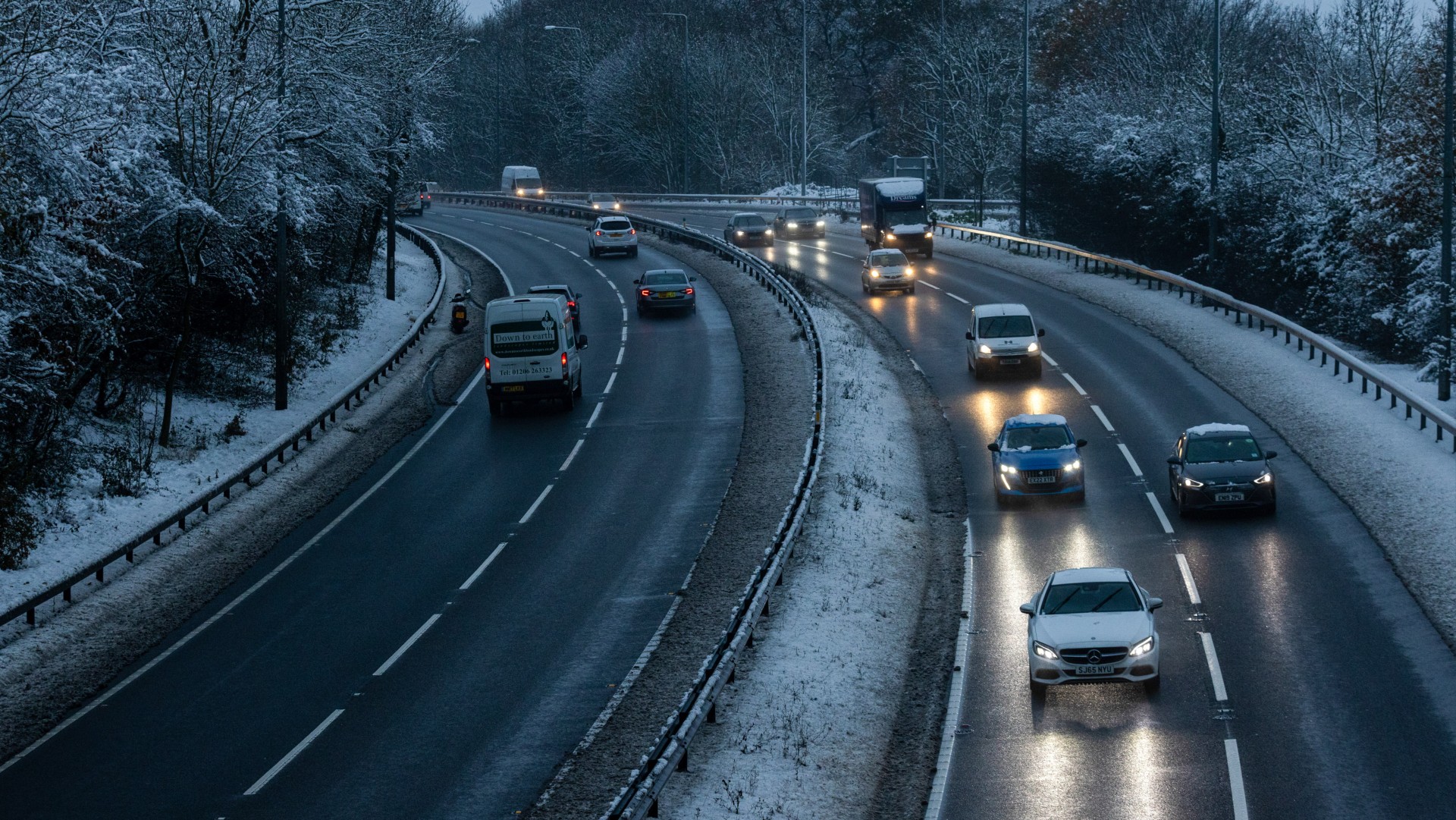 Driving home for Christmas: 20m UK car journeys expected this week
Driving home for Christmas: 20m UK car journeys expected this weekSpeed Read First Covid-free Christmas in three years plus rail strike means this year’s festive getaway ‘set to be biggest ever’
-
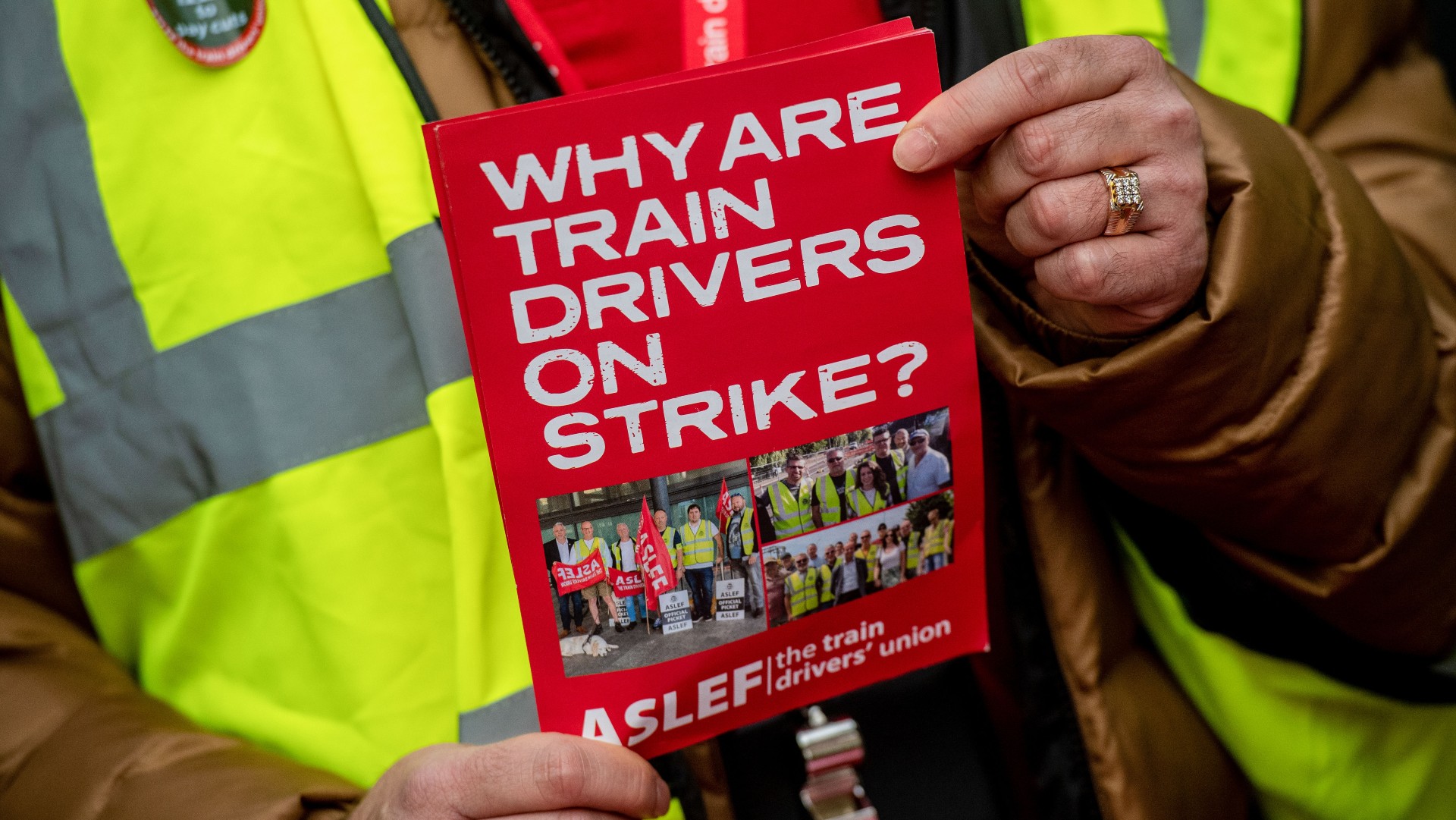 Rail strikes: whose side is the public on?
Rail strikes: whose side is the public on?Talking Point Opinion split over who is to blame for month of train disruptions following failed talks between transport officials and unions
-
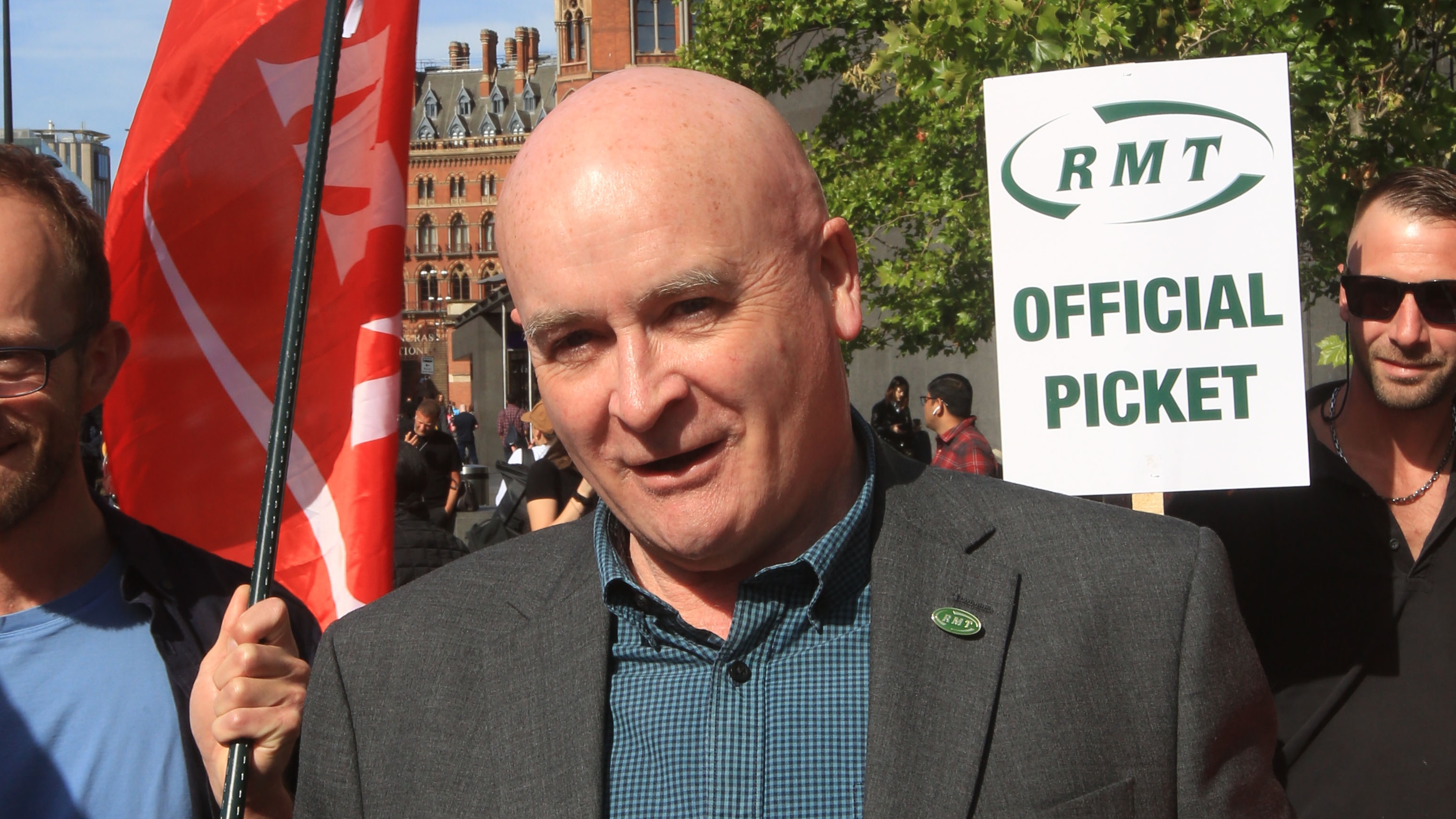 Mick Lynch: the veteran trade unionist leading rail walkouts
Mick Lynch: the veteran trade unionist leading rail walkoutsIn the Spotlight The RMT has reportedly balloted for strike action 200 times under Lynch’s leadership
-
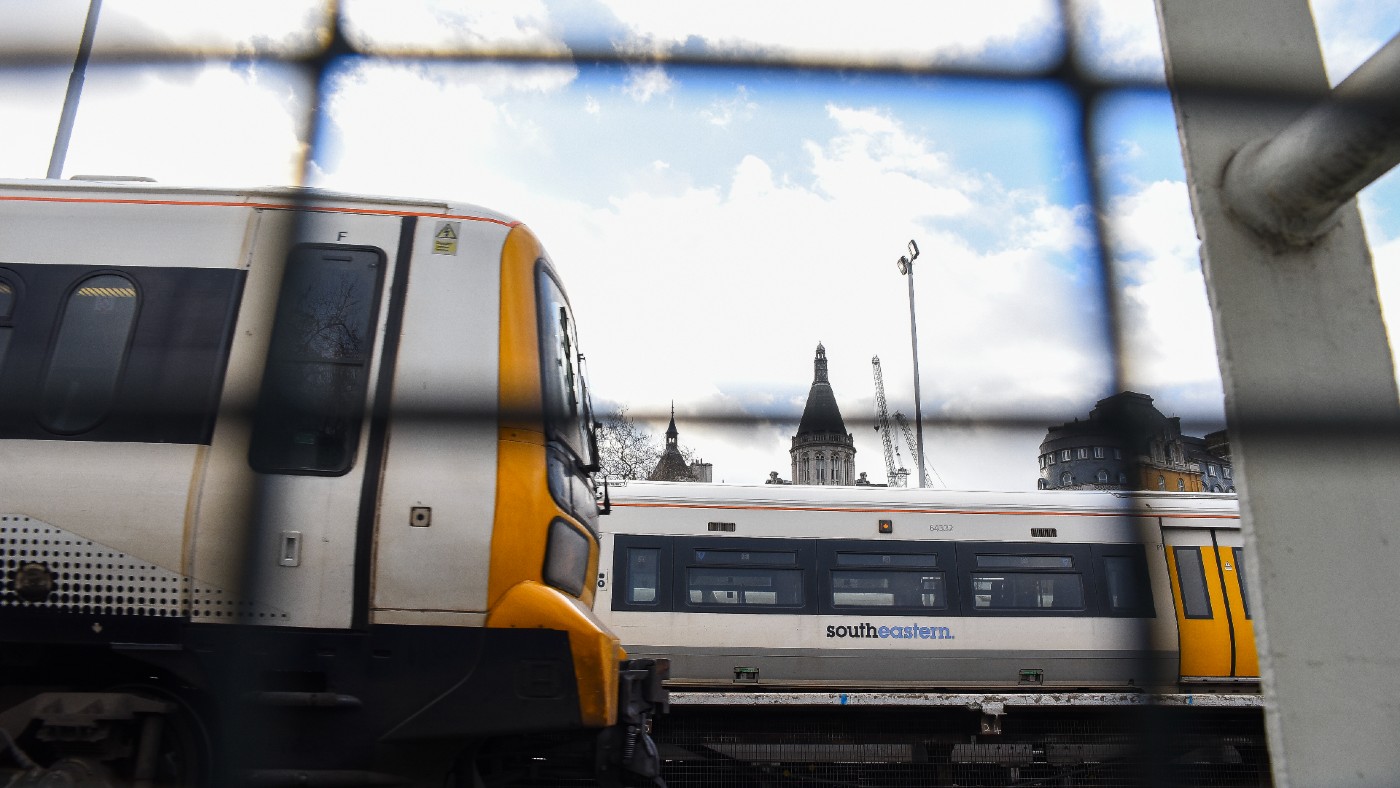 Rail strikes: is Britain on track for a ‘summer of discontent’?
Rail strikes: is Britain on track for a ‘summer of discontent’?Speed Read The ‘biggest rail strike in modern history’ is planned for next week
-
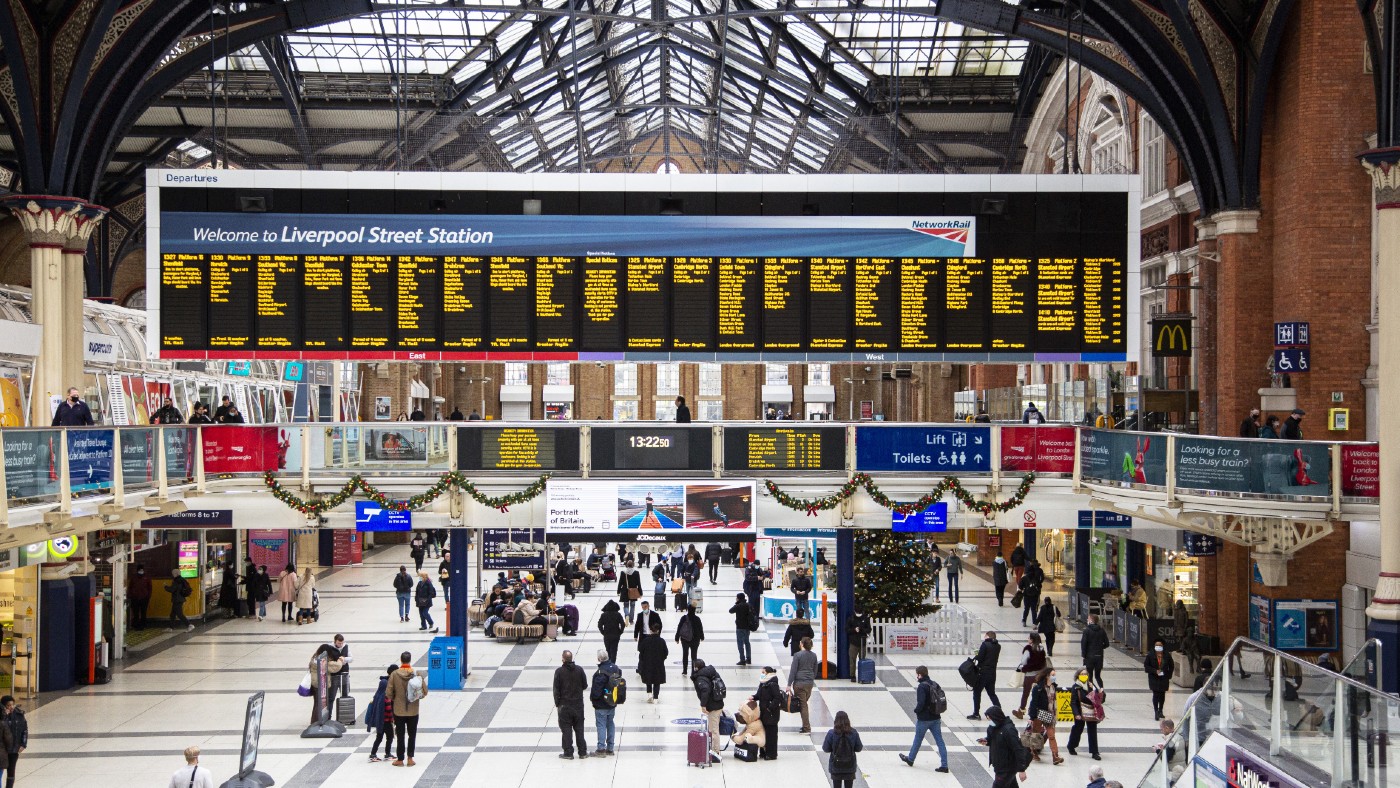 ‘See it. Say it. Sorted’: is it the end of the line for train announcements?
‘See it. Say it. Sorted’: is it the end of the line for train announcements?Speed Read The transport secretary has pledged a ‘bonfire of the banalities’ on England’s railways
-
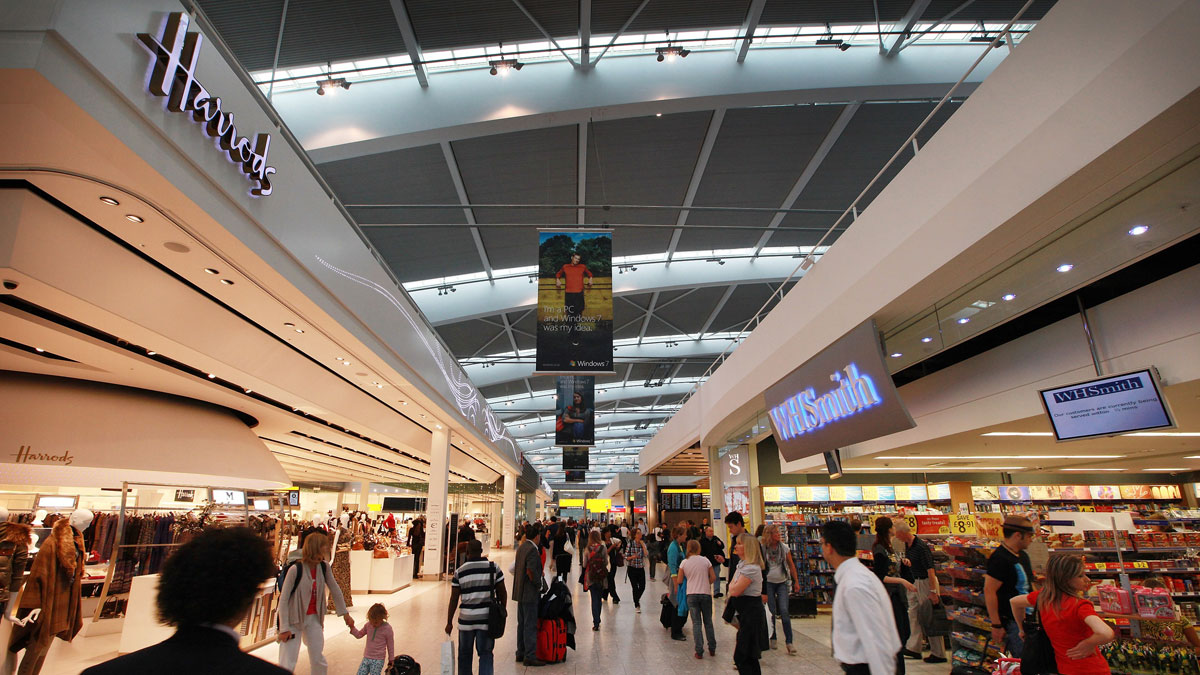 UK to bring in airport Covid tests for arrivals
UK to bring in airport Covid tests for arrivalsSpeed Read MPs call for stricter border measures as South African variant of coronavirus spreads
-
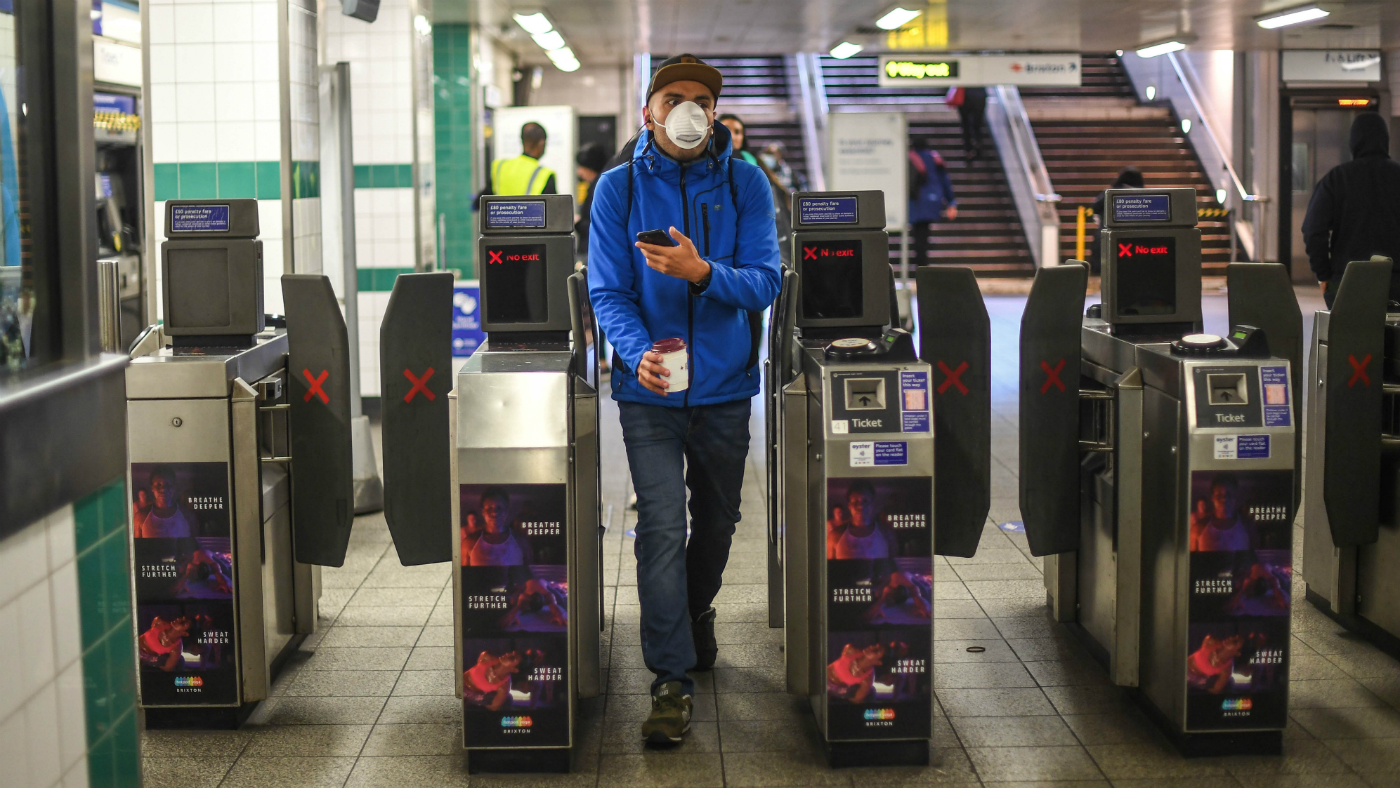 UK records biggest jump in transport use since pandemic began
UK records biggest jump in transport use since pandemic beganSpeed Read Monday rush hour sees spike in commuters across country as trains return to 90% of pre-coronavirus services
-
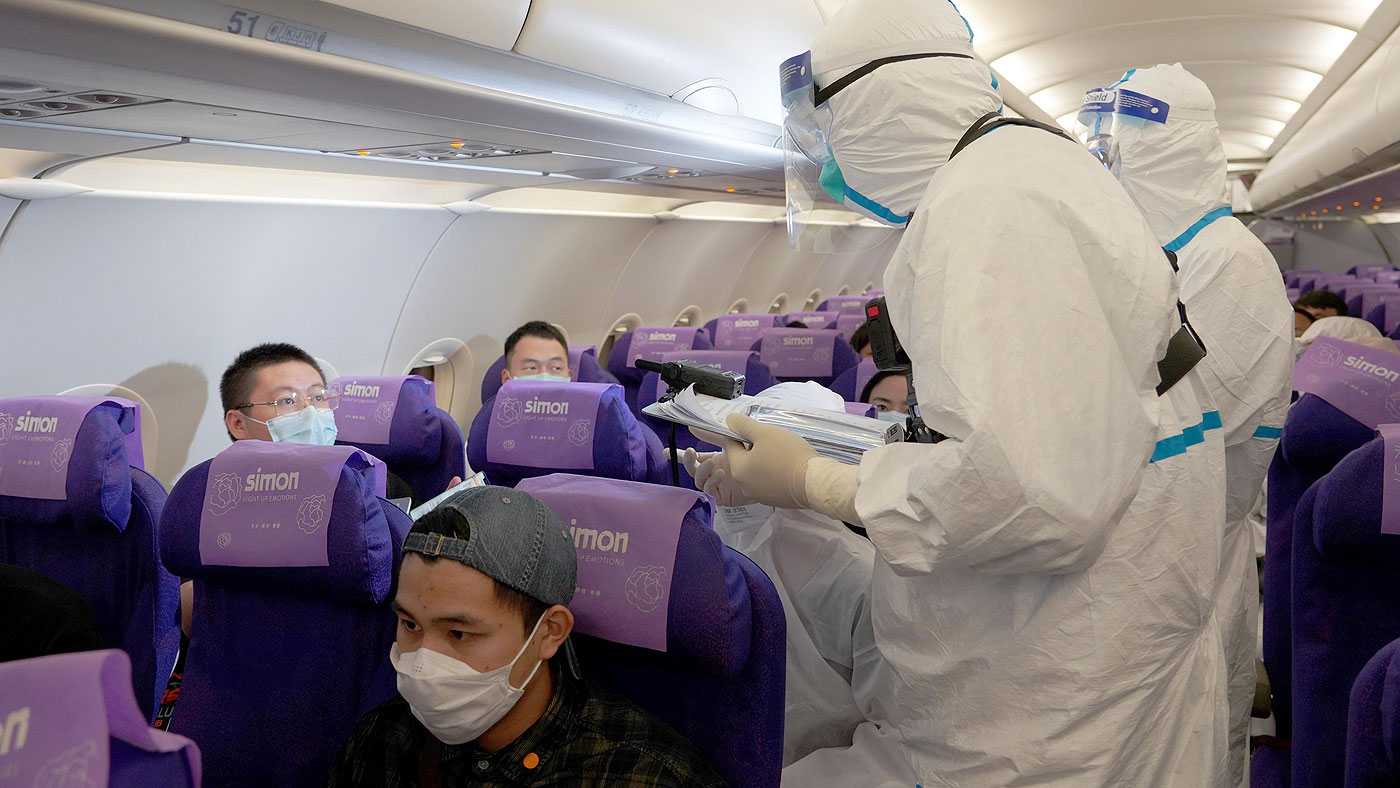 Coronavirus: what are the odds of catching Covid-19 on a plane?
Coronavirus: what are the odds of catching Covid-19 on a plane?Speed Read Studies suggest air travel is safe despite concerns about air quality


